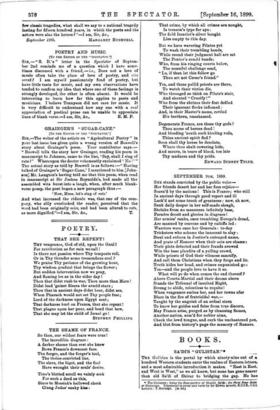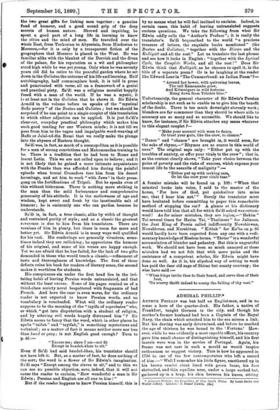BOOKS.
SA'DrS " GULISTAN."*
THE Gul;stan is the portal by which ninety-nine out of a hundred Western students enter the realms of Eastern letters, and a most admirable introduction it makes. "East is East, and West is West," as we all know, but none has gone nearer than old Sa'di of Shiraz to bridging the gap. He has • The Gulistan ; being the Rose-garden of Shaikh Sa'dt: the Past Pow Bab* or Gateways. Translated in prose and Terse by Sir Edwin Arnold, LUX., C.S•L London : T. Burleigh. [3a. Bd.] the two great gifts for linking men together : a genuine fund of humour, and a good sound grip of the deep secrets of human nature. Shrewd and inquiring, he spent a good part of a long life in learning to know the cities and the mind of men. He travelled over the whole East, from Turkestan to Abyssinia, from Hindostan to Morocco,—for it is only by a transparent fiction of the geographers that Morocco is placed in the West. He was familiar alike with the blanket of the Dervish and the divan of the palace, for his reputation as a wit and philosopher stood high while he was yet young. Only when he was seventy years old did he retire to the peaceful garden where he set down in the Gulistan the outcome of his life and learning. Half autobiography, half commonplace book, it is told in prose and punctuated with verse, all on a framework of a genial and practical piety. Sa'di was a religious moralist happily fused with a man of the world. If he was a mystic, it is at least not in the Gulistan that be shows it. Sir Edwin Arnold in the volume before us speaks of the "mystical Sufic poetry " of the Bustan and Gulistan ; but we should be surprised if he can point to a single couplet of this translation to which either adjective can be applied. It is just Sa'di's clear-cut, everyday practical philosophy which makes him such good reading for our Western minds ; it is not till we pass from him to the vague and impalpable word-weaving of Hafiz or Jalal-nd-din Rumi that we really make the plunge into the abysses of Eastern thought.
Sa'di was, in fact, as much of a cosmopolitan as it is possible for a man of strong convictions and Mahommedan training to be. There is a tradition that he had been to Rome and learnt Latin. This we are not called upon to believe ; and it is not likely that he gained a more intimate acquaintance with the Franks than was afforded him during the painful episode when brutal Crusaders tore him from his desert hermitage, and set him to work "with Jews" in their press- gang on the fortifications of Tripoli. But he speaks even of this without bitterness. There is nothing more striking in the man than the mild forbearance and comprehensive generosity of his attitude. It is the mellowness of age and wisdom, kept sweet and fresh by the inestimable salt of humour ; he is eminently one who can pardon because he understands.
Sa'di is, in fact, a true classic, alike by width of thought and restrained purity of style; and as a classic the greatest reverence is due to him from his translators. There are versions of him in plenty, but there is room for more and better yet. Sir Edwin Arnold is in many ways well qualified for his task. His renderings are generally vivacious, some- times indeed they are rollicking ; he appreciates the humour of his original, and some of his verses are happy enough. Yet we are afraid that he has failed, for the lack of two gifts demanded in those who would touch a classic,—refinement of taste and thoroughness of knowledge. The first of these defects ruins his book for readers of literary sense, the second makes it worthless for students.
His conspicuous sin under the first head lies in the irri- tating habit of leaving Persian words untranslated, and that without the least excuse. Some of his pages remind us of a third-class society novel bespattered with fragments of bad French. And here the case' is even worse, for the ordinary reader is not expected to know Persian words, and no vocabulary is vouchsafed. What will the ordinary reader suppose to be the meaning of the " tayifa of reprobates" who, or which, " got into disputation with a student of religion, and by uttering evil words hugely distressed him "? Sir Edwin seems to fancy that the word, which in other places be spells "taifah " and " tayifah," is something mysterious and technical ; as a matter of fact it means neither more nor less than band or gang ; is not English good enough ? Tarn to p. 46 :— "Excuse me; slave I am—not fit Except in bandah-khan to sit."
Even if Sa'di had said bandah-khan, his translator should not have left it. But, as a matter of fact, he does nothing of the sort; the word is a flower of Sir Edwin's imagination.
S says "Except among the slaves to sit," and to this we can see no possible objection, save, indeed, that it will not cause the reader to exclaim, "How wonderful a man is Sir Edwin ; Persian and English are all one to him ! "
But if the reader happens to know Persian himself, this is
by no means what he will feel inclined to exclaim. Indeed, in certain cases, this habit of leaving untranslated suggests curious questions. We take the following from what Sir Edwin oddly calls the "Author's Preface"; it is really the translator's. Sa'di bequeathed to the world "a precious treasure of letters, the exquisite books mentioned" (the Bustan and Gulistan), "together with the Diwan and the Kulliydtt and all the rest." Let us translate the last phrase and see how it looks in English : "together with the Lyrical Cycle, the Complete Works, and all the rest !" Does Sir Edwin think that Kulliyatt, as he chooses to spell it, is the title of a separate poem P Or is he laughing at the reader like Edward Lear in "The Cummerbund: an Indian Poem"?—
"Around her bower, with quivering leaves, The tall Kamsamahs grew, And Kitmutgars in wild festoons Hung down from Tchokis blue."
Unfortunately, the general character of Sir Edwin's Persian scholarship is not such as to enable us to give him the benefit of the doubt. There is too much downright slovenly work ; blunders are far commoner than they should be where aids to accuracy are so many and so accessible. We should like to know, for instance, if Sir Edwin attaches any sense whatever to this elegant couplet ?-
" Make your account with woes to dance, Or trust your guts, like the crow, to chance."
"Dance" and "chance" are brought in, it would seem, for the sake of rhyme,—" Rhymes are so scarce in this world of ours." The original says only : "Either put up with the troubles of anxiety, or offer your vitals to the crow"; that is, as the context clearly shows, " Take your choice between the pains of poverty and the risks of success, which exposes your inmost life to the assaults of malignity " Either put up with carking care, Or let the crow your vitals tear."
A funnier mistake will be found on p. 108: " When that minstrel broke into voice, I said to the master of the house, For love of God, put quicksilver into mine ear, that I hear him not.' " Surely the translator must have hesitated before committing to paper this remarkable method of stopping the ear? A glance at his dictionary would have told him that all for which Sa'di asked was cotton- wool ! As for minor mistakes, they are legion,—" Hakim " Tai several times for Hatim Tai, " Thalinoos " for Jalinoos,
the Just King of Persia called indifferently Nowshirwan, Nowshirwan, and Nurshivan. " Kiblah " for Ka'ba on p. 86
would hardly have been expected from any one with a rudi- mentary knowledge of Moslem terms. " Tartar" is a wonderful accumulation of blunder and pedantry. But this is ungrateful work. We should not have been so much annoyed at these mistakes had we not felt that with more pains and the assistance of a competent scholar, Sir Edwin might have done so well. As it is, his slipshod way of setting to work has paid the dear old sage of Shiraz but scanty courtesy; the wise have said :- "When kings invite thee to their board, and serve thee of their best, 'Tis scurvy thrift indeed to scamp the fulling of thy vest."



































 Previous page
Previous page